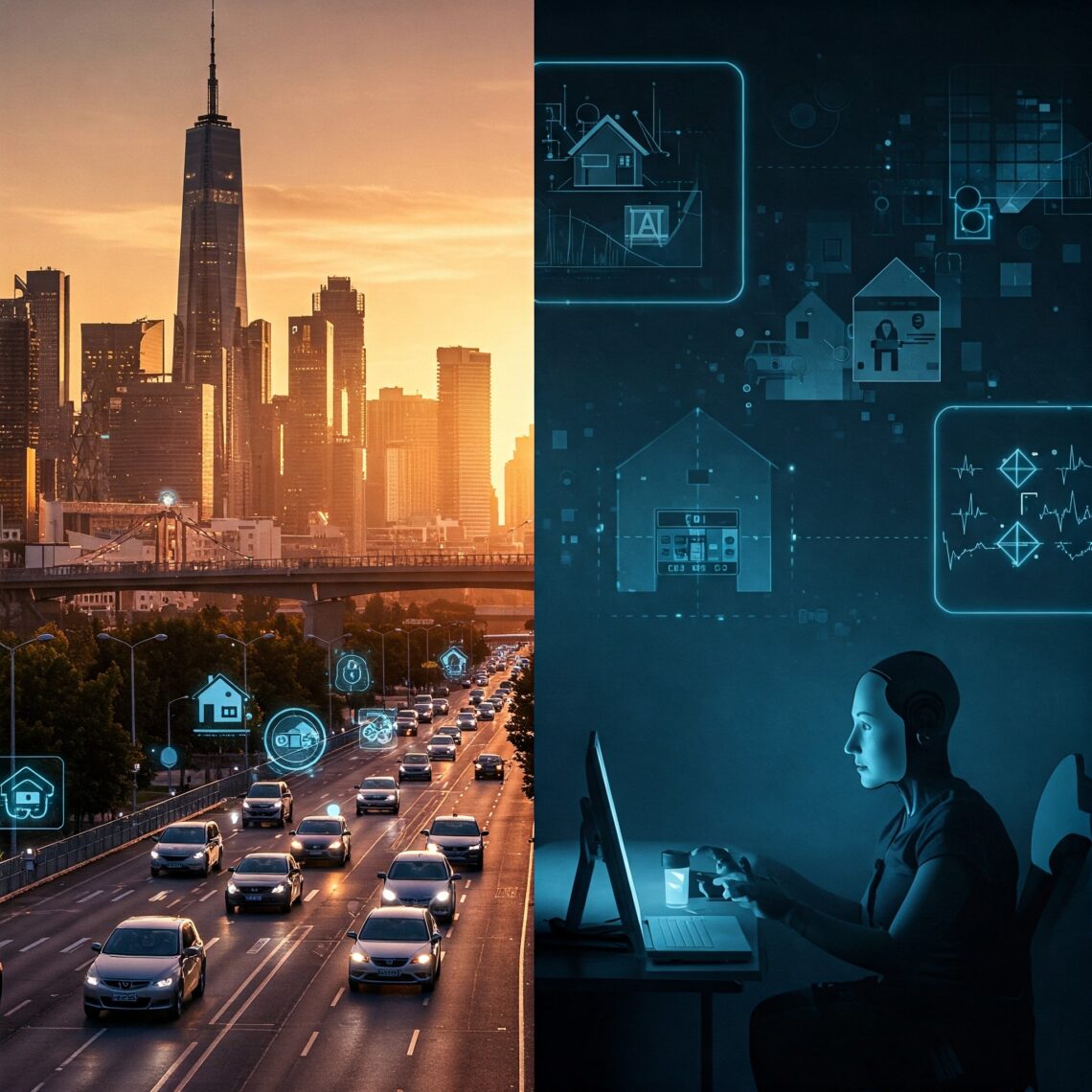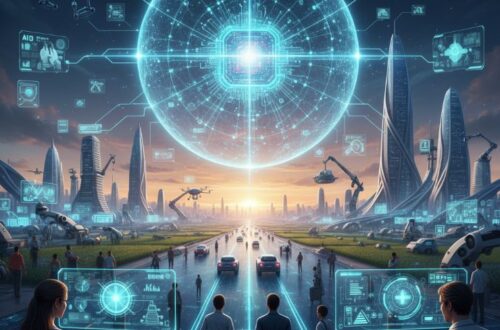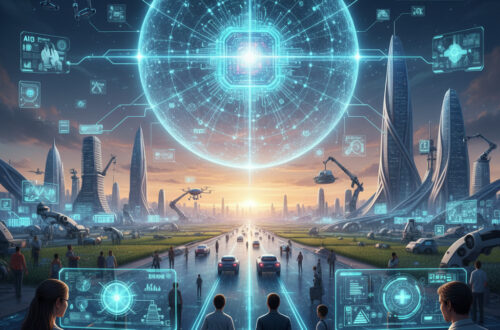Artificial Intelligence (AI) has rapidly moved from the realm of science fiction to become a transformative force shaping our world. From the smartphones in our pockets to the complex algorithms driving industries, AI’s influence is undeniable. This article delves into the significant AI benefits and risks, exploring how this groundbreaking technology presents both unprecedented opportunities and potential pitfalls that demand careful consideration. Understanding these dual aspects is crucial for general readers, tech enthusiasts, students, and professionals alike who are keen to grasp AI’s profound impact on our future.
Introduction to Artificial Intelligence
At its core, Artificial Intelligence refers to the ability of computer systems to perform tasks that typically require human intelligence. These tasks include learning, problem-solving, decision-making, and understanding natural language. Once a futuristic concept, AI is now a trending and critical topic due to its increasing sophistication and its integration into virtually every facet of modern life. Its potential to revolutionize industries, improve efficiency, and even redefine human capabilities makes it a subject of intense global interest and scrutiny.
1. Top Benefits of Artificial Intelligence
The allure of AI lies in its capacity to enhance human capabilities and solve complex problems with remarkable efficiency. Here are some of the key advantages of AI:
1.1 Increased Efficiency and Automation
One of the most significant benefits of AI is its ability to automate repetitive and time-consuming tasks across various sectors. In manufacturing, AI-powered robots can perform intricate assembly line work with greater speed and accuracy than humans. The banking and financial industries leverage AI for tasks like fraud detection and transaction processing, leading to significant time and cost savings. Similarly, in logistics, AI optimizes delivery routes and manages supply chains with unparalleled efficiency.
1.2 Enhanced Decision Making
AI excels at analyzing vast amounts of data far beyond human capacity, identifying patterns, and generating insightful predictions. This capability enhances decision-making in critical areas such as finance, where AI algorithms can forecast market trends and assess risks. In marketing, AI helps personalize campaigns and optimize advertising strategies. Even in meteorology, AI improves the accuracy of weather forecasting, providing crucial information for planning and safety.
1.3 Healthcare Advancements
The application of AI in healthcare is yielding transformative results. AI algorithms are proving invaluable in diagnostics, assisting radiologists in identifying anomalies in medical images like X-rays and MRIs, leading to earlier and more accurate cancer detection. Furthermore, AI is paving the way for personalized medicine, tailoring treatments based on an individual’s genetic makeup and medical history, promising more effective and targeted therapies.
2.4 Boost in Productivity Across Industries
Beyond manufacturing and finance, AI is boosting productivity across a wide range of industries. In agriculture, AI-powered sensors and drones monitor crop health, optimize irrigation, and predict yields. Logistics benefits from AI-driven route optimization and warehouse management. In education, AI is enabling personalized learning experiences, adapting to individual student needs and paces.
1.5 AI in Everyday Life
AI has seamlessly integrated into our daily routines. Virtual assistants like Alexa and Siri respond to our voice commands, manage schedules, and provide information. Smart homes utilize AI to automate lighting, temperature control, and security systems. Recommendation engines on platforms like Netflix and Amazon use AI algorithms to suggest content and products tailored to our preferences, enhancing user experience and driving consumption.
2. Major Risks and Challenges of Artificial Intelligence
Despite its numerous benefits, the advancement of AI also presents significant risks of Artificial Intelligence and challenges that society must address proactively.
2.1 Job Displacement and Economic Disruption
A major concern surrounding AI is its potential to displace human workers through automation. Sectors heavily reliant on repetitive tasks, such as manufacturing and transportation (with the advent of self-driving vehicles), are particularly at risk. The long-term impact on employment and the labor market could be substantial, potentially leading to economic disruption and the need for workforce retraining and adaptation.
2.2 Bias and Discrimination in Algorithms
AI algorithms learn from the data they are trained on, and if this data reflects existing societal biases, the AI system can perpetuate and even amplify these prejudices. Real-life cases have shown bias in facial recognition technology, leading to misidentification of individuals from certain demographic groups. Similarly, AI-powered hiring tools have been found to discriminate against certain genders or ethnicities due to biased training data. The lack of transparency and explainability in some AI models makes it difficult to identify and rectify these biases.
2.3 Privacy and Surveillance Concerns
The development and deployment of AI often rely on the collection and analysis of vast amounts of personal data. This raises significant privacy concerns regarding how this data is stored, used, and potentially misused. AI-powered surveillance technologies, employed by both governments and corporations, can track behavior and erode individual privacy, raising ethical questions about the balance between security and freedom.
2.4 Security Threats and AI Misuse
As AI becomes more sophisticated, so do the potential security threats associated with it. Deepfakes, AI-generated realistic but fabricated videos or audio, can be used for disinformation and malicious purposes. The development of autonomous weapons raises serious ethical and security concerns about the potential for machines to make life-or-death decisions without human intervention. Furthermore, AI can be leveraged to create more sophisticated and targeted cyberattacks, posing a significant threat to individuals, organizations, and critical infrastructure.
2.5 Ethical and Social Implications
The increasing autonomy of AI systems raises profound ethical and social implications. The moral dilemma of AI decision-making becomes apparent in scenarios where autonomous vehicles face unavoidable accidents. Determining responsibility when an AI system makes a mistake is another complex issue. Who is accountable – the programmer, the user, or the AI itself? These questions necessitate careful consideration and the development of ethical frameworks for AI development and deployment.
3. Balancing Benefits and Risks
Harnessing the immense potential of AI while mitigating its inherent risks requires a multifaceted approach.
3.1 Importance of Regulation and Governance
Governments and tech companies have a crucial role to play in establishing regulations and governance frameworks for AI development and deployment. International efforts, such as the EU AI Act and UNESCO AI guidelines, aim to create standards and ethical principles to guide the responsible use of AI. These initiatives seek to balance innovation with the need to protect fundamental rights and ensure safety.
3.2 Need for Transparency and Explainability
Making AI systems more transparent and explainable is essential for building trust and accountability. Researchers are working on developing “explainable AI” (XAI) techniques that allow humans to understand how AI models arrive at their decisions. This increased transparency can help identify biases, debug errors, and ensure that AI systems are operating fairly and ethically.
3.3 Ethics in AI Development
Integrating ethical considerations into the very fabric of AI development is paramount. This includes promoting inclusive and unbiased data sets, designing algorithms with fairness in mind, and fostering a culture of responsible innovation among AI developers and researchers. By prioritizing ethical principles, we can strive to create AI systems that benefit all of humanity.
Conclusion
Artificial Intelligence stands at a pivotal juncture, offering remarkable opportunities to enhance our lives and solve some of the world’s most pressing challenges. However, these advancements come with significant risks that cannot be ignored. Balancing the advantages of AI with the potential risks of Artificial Intelligence requires a proactive and thoughtful approach, emphasizing regulation, transparency, and ethical considerations. As AI continues to evolve, it is crucial for all of us to stay informed and engage responsibly with this powerful technology to ensure a future where its benefits are maximized and its potential harms are minimized.





